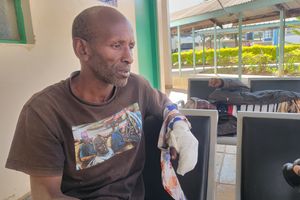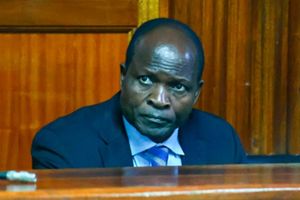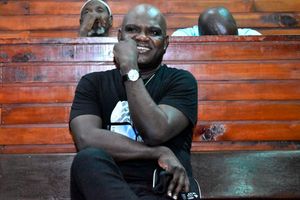
On February 27, 2025, a 12-year-old pupil was arrested in Kuresoi for fatally stabbing a 13-year-old classmate.
When a child commits a crime or comes into conflict with the law, their treatment falls under a special legal framework designed to protect their rights while ensuring accountability.
Unlike adults, children are recognised as individuals still developing in terms of maturity, decision-making and comprehension of consequences.
This distinction necessitates a rehabilitative rather than punitive approach to justice.
Last Thursday, a tragic incident at Kipkoibet Comprehensive School in Kuresoi South in Nakuru County left a community in shock after a 12-year-old Grade Four pupil was arrested for allegedly stabbing a 13-year-old classmate.
The circumstances surrounding the altercation remain unclear but reports indicate that the victim succumbed to injuries sustained in the attack.
The deceased’s body was taken to Olenguruone Sub-County Hospital mortuary for preservation and postmortem examination.
Kuresoi South Sub-County Police Commander Francis Omullo on Monday confirmed the suspect’s arrest but refrained from divulging further details.
“I cannot reveal much information at the moment since the case involves a minor. But he was taken into custody,” Mr Omullo told Nation.africa.
According to the area chief Peter Langat, the minor got into the fight with the deceased while they were at a Posho mill on Thursday at 7pm.
The minor, who is a Grade Three pupil, is said to have picked a fight with the Grade Four pupil, and stabbed on the back using a knife he had been armed with.
He was rushed to a nearby private hospital but succumbed to his injuries while receiving treatment.
“The boy lives with his grandmother after his mother remarried. There was a time he wanted to attack his grandmother but she was helped by Nyumba kumi officials. After committing the crime, he went into hiding and was later arrested and handed over to police. The community prefers he be kept in a safe house Borstal institutions,” said Mr Langat
Thie incident has sparked discussions about how the justice system handles children accused of serious crimes.
It also raises questions about the legal implications of criminal responsibility for minors in Kenya and what the law stipulates regarding such cases.
According to Timothy Khasogo, an advocate, a cases involving children are governed by the Penal Code of Kenya and principles of juvenile criminal justice.
He said that what the Penal Code provides for is not for categories for schools but it is a factor for consideration.
Mr Khasogo said that section 14(2) states that a person under the age of eight years is not criminally responsible for any act or omission.
A person under the age of 12 years is not criminally responsible for an act or omission, unless it is proved that at the time of doing the act or making the omission he had capacity to know that he ought not to do the act or make the omission.
He notes that section 14(2) gives the court discretion to determine whether a child under the age of 12 years and not below 8 years can be found to be criminally liable.
According to Khasogo in the case of the minor in question, the prosecution will have to prove to court that at the time of this child committing the crime act, he had capacity to know that he ought not to make the omission.
He said that the prosecution will have to prove that at the time of the act the minor knew it was wrong to stab the friend or even knew the possible impact of his actions.
This according to Mr Khasogo will be ascertained by looking at the number of stab wounds, the circumstance that led to the fight and also when they were fighting was he using the knife or he ran for the weapon.
“A child can stab the other thinking that they are playing not knowing it might hurt or even the effect of stabbing someone, but in other instances the minor might be knowing that if he/she stabs someone he will hurt or kill,” he said.
“The court will consider if there were any other weapons that could be used during the fight like using stones or sticks or he just chose the knife. If the prosecution shows what the kid did was wrong, the boy can be held criminally liable.”
He notes that the principles governing the juvenile justice system states that after ascertaining the actual age, he will not be taken to court ordinarily like other accused persons.
Instead when he will be presented in court, he will be heard in camera rather than in an open court.
According to the Children court practice direction by the Chief Justice, children in contact with the law have rights and freedom before the law equal to those enjoyed by adults and in particular the right to be heard and to participate in proceedings of the court that can affect them.
Children in conflict with the law accused of committing serious crimes are vulnerable due to their age, level of maturity or disability when standing trial in the court.
The trial process should not itself expose the child to avoidable intimidation, humiliation or distress, as the ordinary trial process in court is therefore adapted to meet those ends.
In this regard, the court uses available and administrative resources, timely disposal of proceedings at a cost affordable by the respective parties, use of alternative dispute resolution mechanism for expeditious disposal of cases and use of appropriate technology.
“All courts shall set aside specific days where all children in contact with the law matters shall be handled by a specific court. The children court shall also have specific children officers to handle its matters. Whether detained or while being taken or waiting to be attended they should not be held with adults. A female child should be accompanied by a woman officers,” the directions read in part.
On the other hand, Prosecutor’s guide to children in the criminal justice system developed pursuant to the constitution of Kenya 2010 state that any child within the criminal justice system, either a child in conflict with the law or a child in contact with the law must be protected from the torture or other cruel, inhumane, degrading treatment or punishment.
They should be provided with all necessary information and have that information explained to them in a language they understand and where they are too young to express themselves clearly they should be assisted to do or represented.
It further states that they should not be compelled to participate but rather, be approached in a manner that encourages their participation and where it may prejudice their mental, emotional or psychological development, they should be exempted from taking part in the proceedings.











